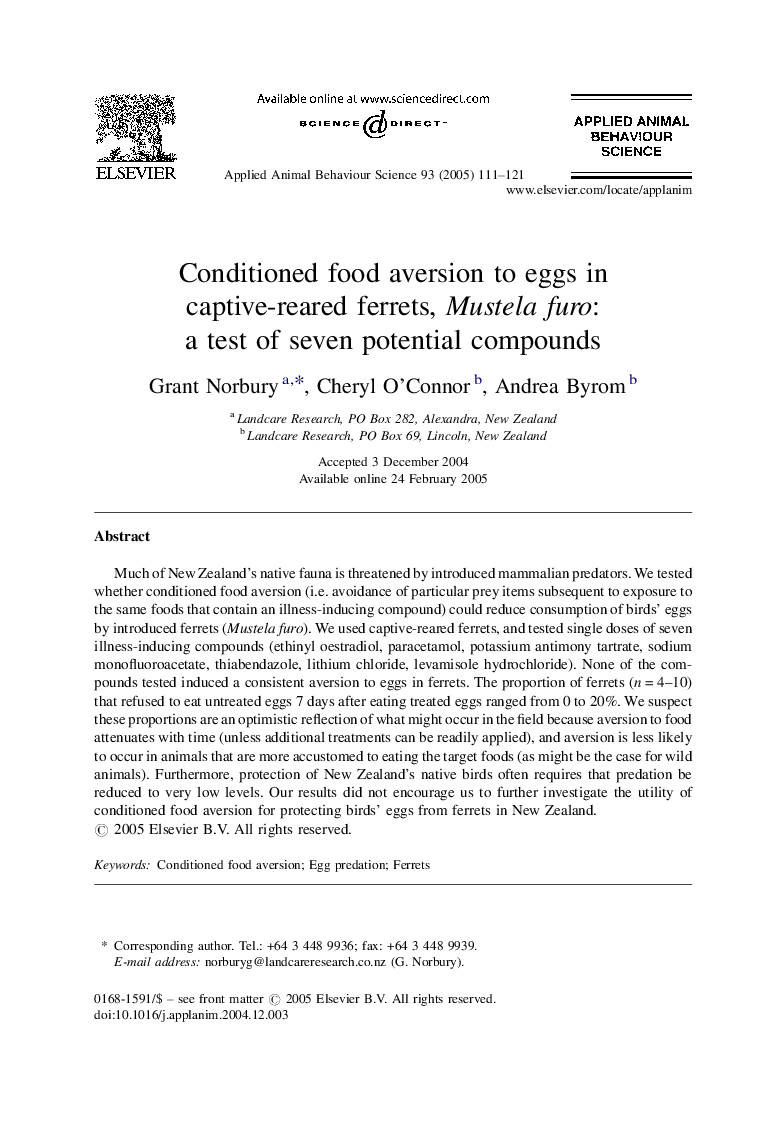| کد مقاله | کد نشریه | سال انتشار | مقاله انگلیسی | نسخه تمام متن |
|---|---|---|---|---|
| 9475896 | 1625455 | 2005 | 11 صفحه PDF | دانلود رایگان |
عنوان انگلیسی مقاله ISI
Conditioned food aversion to eggs in captive-reared ferrets, Mustela furo: a test of seven potential compounds
دانلود مقاله + سفارش ترجمه
دانلود مقاله ISI انگلیسی
رایگان برای ایرانیان
موضوعات مرتبط
علوم زیستی و بیوفناوری
علوم کشاورزی و بیولوژیک
علوم دامی و جانورشناسی
پیش نمایش صفحه اول مقاله

چکیده انگلیسی
Much of New Zealand's native fauna is threatened by introduced mammalian predators. We tested whether conditioned food aversion (i.e. avoidance of particular prey items subsequent to exposure to the same foods that contain an illness-inducing compound) could reduce consumption of birds' eggs by introduced ferrets (Mustela furo). We used captive-reared ferrets, and tested single doses of seven illness-inducing compounds (ethinyl oestradiol, paracetamol, potassium antimony tartrate, sodium monofluoroacetate, thiabendazole, lithium chloride, levamisole hydrochloride). None of the compounds tested induced a consistent aversion to eggs in ferrets. The proportion of ferrets (n = 4-10) that refused to eat untreated eggs 7 days after eating treated eggs ranged from 0 to 20%. We suspect these proportions are an optimistic reflection of what might occur in the field because aversion to food attenuates with time (unless additional treatments can be readily applied), and aversion is less likely to occur in animals that are more accustomed to eating the target foods (as might be the case for wild animals). Furthermore, protection of New Zealand's native birds often requires that predation be reduced to very low levels. Our results did not encourage us to further investigate the utility of conditioned food aversion for protecting birds' eggs from ferrets in New Zealand.
ناشر
Database: Elsevier - ScienceDirect (ساینس دایرکت)
Journal: Applied Animal Behaviour Science - Volume 93, Issues 1â2, September 2005, Pages 111-121
Journal: Applied Animal Behaviour Science - Volume 93, Issues 1â2, September 2005, Pages 111-121
نویسندگان
Grant Norbury, Cheryl O'Connor, Andrea Byrom,